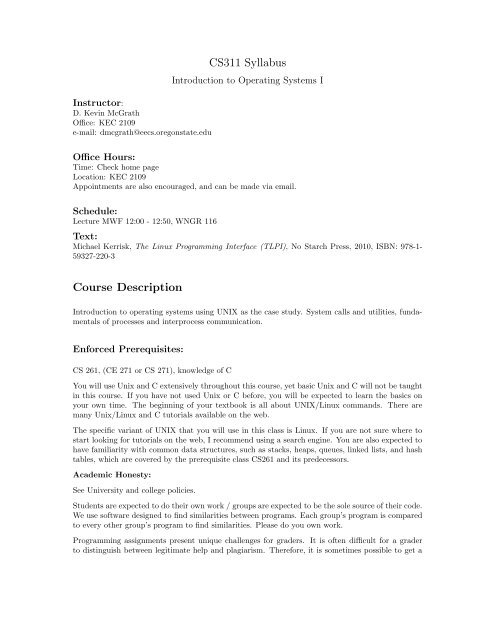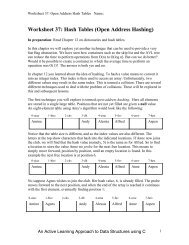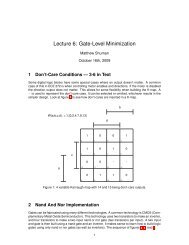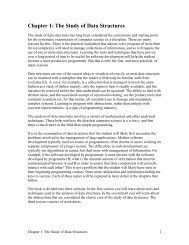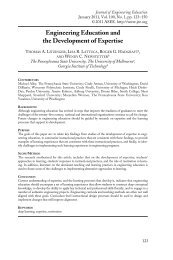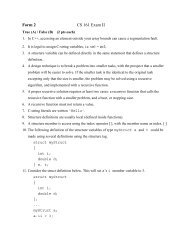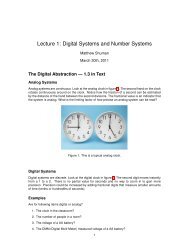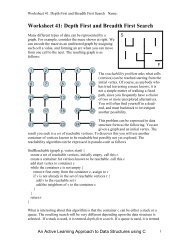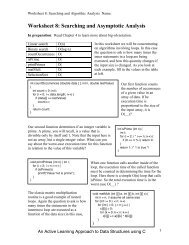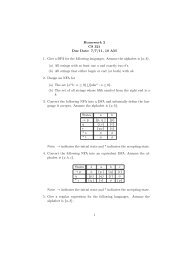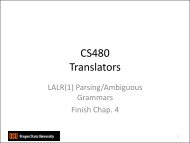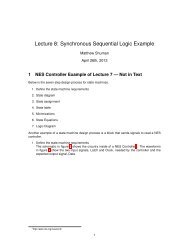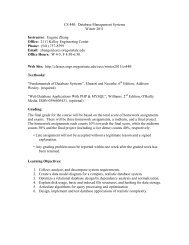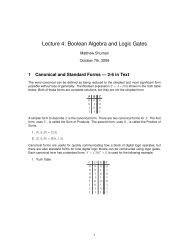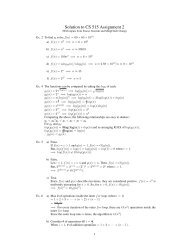CS 311 Project 1: UNIX File I/O - Classes
CS 311 Project 1: UNIX File I/O - Classes
CS 311 Project 1: UNIX File I/O - Classes
You also want an ePaper? Increase the reach of your titles
YUMPU automatically turns print PDFs into web optimized ePapers that Google loves.
Instructor:<br />
D. Kevin McGrath<br />
Office: KEC 2109<br />
e-mail: dmcgrath@eecs.oregonstate.edu<br />
<strong>CS</strong><strong>311</strong> Syllabus<br />
Introduction to Operating Systems I<br />
Office Hours:<br />
Time: Check home page<br />
Location: KEC 2109<br />
Appointments are also encouraged, and can be made via email.<br />
Schedule:<br />
Lecture MWF 12:00 - 12:50, WNGR 116<br />
Text:<br />
Michael Kerrisk, The Linux Programming Interface (TLPI), No Starch Press, 2010, ISBN: 978-1-<br />
59327-220-3<br />
Course Description<br />
Introduction to operating systems using <strong>UNIX</strong> as the case study. System calls and utilities, fundamentals<br />
of processes and interprocess communication.<br />
Enforced Prerequisites:<br />
<strong>CS</strong> 261, (CE 271 or <strong>CS</strong> 271), knowledge of C<br />
You will use Unix and C extensively throughout this course, yet basic Unix and C will not be taught<br />
in this course. If you have not used Unix or C before, you will be expected to learn the basics on<br />
your own time. The beginning of your textbook is all about <strong>UNIX</strong>/Linux commands. There are<br />
many Unix/Linux and C tutorials available on the web.<br />
The specific variant of <strong>UNIX</strong> that you will use in this class is Linux. If you are not sure where to<br />
start looking for tutorials on the web, I recommend using a search engine. You are also expected to<br />
have familiarity with common data structures, such as stacks, heaps, queues, linked lists, and hash<br />
tables, which are covered by the prerequisite class <strong>CS</strong>261 and its predecessors.<br />
Academic Honesty:<br />
See University and college policies.<br />
Students are expected to do their own work / groups are expected to be the sole source of their code.<br />
We use software designed to find similarities between programs. Each group’s program is compared<br />
to every other group’s program to find similarities. Please do you own work.<br />
Programming assignments present unique challenges for graders. It is often difficult for a grader<br />
to distinguish between legitimate help and plagiarism. Therefore, it is sometimes possible to get a
good score without really understanding what you have handed in.<br />
Honesty is absolutely essential in order for learning to take place. It will form the foundation of<br />
your professional integrity in your career.<br />
If you are having trouble with an assignment, you are encouraged to discuss it with other students,<br />
TAs, the instructor, or anyone else who will listen, but don’t just have someone else tell you how<br />
to solve the problem! If other students ask you for help, don’t just let them copy your work! It<br />
is possible to discuss problems without plagiarizing. One of the best methods of debugging is to<br />
explain your solution to someone else.<br />
If you get help from, give help to, or work together with someone, you must (in the program header<br />
block) list that person as a collaborator and describe the help. Programs that are very similar will<br />
be subjected to review unless both programs indicate that they were produced collaboratively. We<br />
use plagiarism-detection software check your code against the code from other students. It is quite<br />
sophisticated and can easily see through variable name changes and formatting differences.<br />
If you get help from printed or online sources, you must cite your references.<br />
If you are found in violation of any of the above policies, whether you are the giver or receiver<br />
of help, you will receive a zero on the assignment or fail the course (Instructor’s discretion). The<br />
academic dishonesty charge will be documented and sent to your school’s dean and the Office of<br />
Student Conduct. The first offense results in a warning; the second offense results in an academic<br />
dishonesty charge on your transcript, a disciplinary hearing, and possible expulsion.<br />
The bottom line is: Each student is expected to understand all aspects of the programs s/he submits<br />
for credit.<br />
Learning Objectives<br />
• Explain why multiprogramming is important for modern operating systems.<br />
• Explain the general structure of a multiprogrammed operating system.<br />
• Explain the purpose and operation of system calls.<br />
• Write a program utilizing system calls.<br />
• Write a program using a scripting language.<br />
• Write a program that uses regular expressions to parse input data.<br />
• Write a program that spawns processes and provides mutual exclusion for variables or other<br />
resources shared by the processes.<br />
• Write a program that uses sockets to implement a client/server system.<br />
• Explain how a common file system works, including structure, I/O operations, and security.<br />
• Describe the memory organization of a typical process in a common operating system.<br />
Grading<br />
• Programming projects: 50%
• Midterms: 20%<br />
• Quizzes: 10%<br />
• Final exam: 20%<br />
Grades are recorded as their GPA equivalent. As such, a 95 is recorded as 4, an 81 is recorded as a<br />
B, etc. Pluses and minuses are not used in this course. Therefore, while extra credit is available, it<br />
can only help offset missed points on the current assignment.<br />
Exams<br />
There are 3 exams offered during the term. Only the two highest will count. The final midterm<br />
is offered the Friday of dead week. As it is technically an optional exam, this does not violate any<br />
policies.<br />
If you miss an exam, it will simply be counted as your dropped exam.<br />
<strong>Project</strong>s<br />
All project must be submitted electronically by 11:59pm on the due date at the engr submission<br />
site.<br />
They will be accepted late with a 5% penalty per weekday and / or 5% per weekend, UP TO ONE<br />
WEEK LATE. If you submit a late assignment, you must notify the TAs separately via email or<br />
else he/she will not know to look for your assignment. You may not submit the last project<br />
late.<br />
You have the right to make use of 2 grace days, used in increments of 1 day. These allow you to<br />
have an unpenalized late assignment by up to 2 days (weekends still count as a single day for this).<br />
These must be invoked prior to the submission deadline, and must be invoked via email. Failure to<br />
follow this procedure renders the late day invalid, though consumed.<br />
All grading will be done on Linux on os-class. We highly recommend that you do your development on<br />
a Linux operating system or at least test your assignments on os-class.engr.oregonstate.edu,<br />
a Linux machine provided specifically for use by <strong>CS</strong><strong>311</strong>. You can log onto it via SSH. Standard<br />
policies apply: you must have a campus IP to directly log in, or log in via flip or nome.<br />
Compilation will be on the os-class server. Assignments which do not compile will receive a grade<br />
of 0. It does not matter if your code compiles with icc, suncc, msvc, on your computer, on your best<br />
friend’s uncle’s neighbor’s dog’s computer, or anywhere else. If it doesn’t compile on os-class, it<br />
doesn’t compile.<br />
All work must be done individually unless specifically allowed to work in groups.<br />
Final Grade Assignment<br />
There will be no curve given in this course. The grading scale is as follows:
3.8 ≤ A ≤ 4.0<br />
2.8 ≤ B < 3.8<br />
1.8 ≤ C < 2.8<br />
0.8 ≤ D < 1.8<br />
0.0 ≤ F < 1.0<br />
There will be opportunities on nearly every assignment for extra credit. Do not ask for extra credit<br />
beyond what is offered in class, as it will not be given.<br />
Your 3 exams scores must have a weighted average ≥ 1.0 in order to pass the course. Only the 2<br />
highest midterm grades will be counted.<br />
All programming projects must be submitted in order to pass the course. Students missing assignments<br />
at the end of the term will automatically receive an F grade.<br />
Students who do not submit the final exam will automatically receive an F grade.


